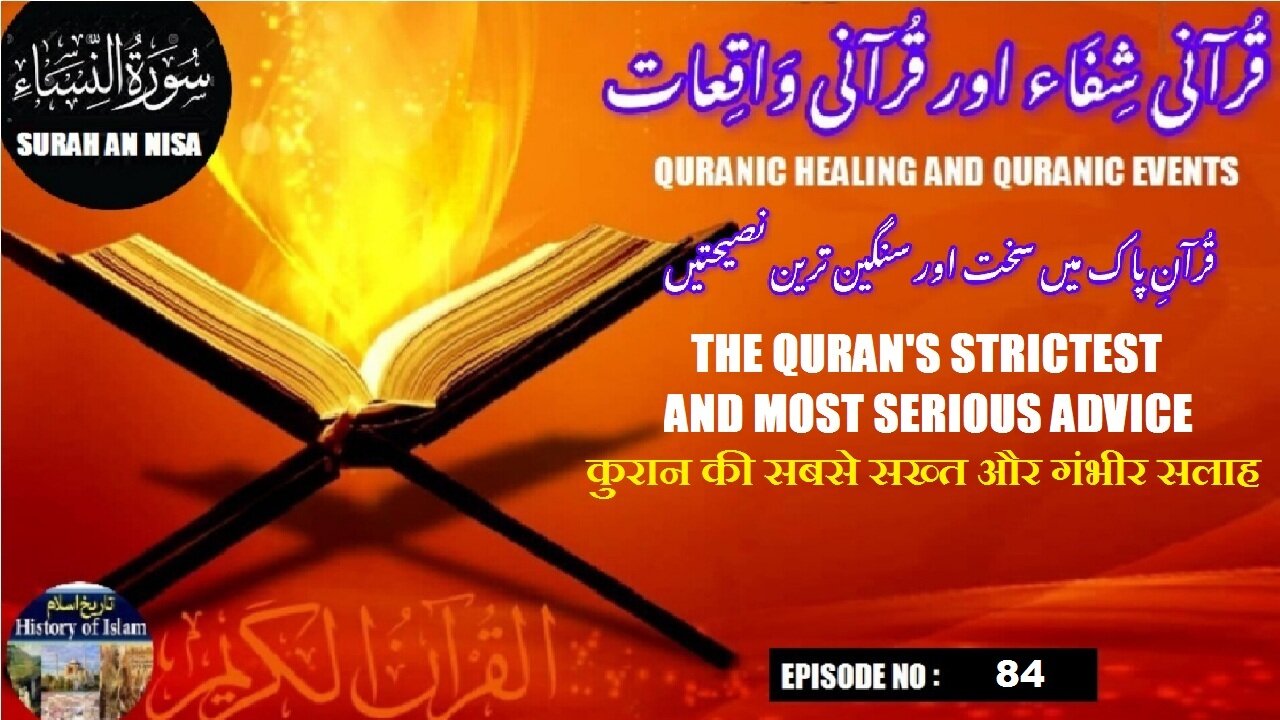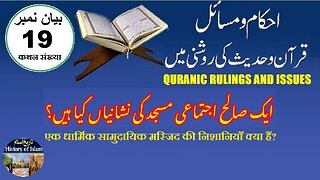Premium Only Content

The Quran's strictest and most serious advices قرآن کی سخت ترین اور سنجیدہ ترین نصیحتیں۔
@islamichistory813 #healing #and #events #from #the #quran #historical #stories #and #events #quranicstories #selfhealing #success #stories #striking #events #in #history #quranstories, #storiesfromthequran #religious #creation #stories #trending #quran #short #historical #loves #historical #heroes #what #is #true #strength #calm #quran #recitation #for #babies #islamic #healing
Severe Punishments for Spreading Corruption on Earth | Quran verse 33 of Surah Al-Ma’idah Explained
Brothers, sisters, friends and elders Assalamu Alaikum, wa Rahmatullahi wa Barakatuhu, we are presenting the 84th episode of the Islamic informative video based on healing and events from the Holy Quran, and in this video we will describe,Severe Punishments for Spreading Corruption on Earth | Quran verse 33 of Surah Al-Ma’idah Explained
Verse 33 of Surah Al-Ma’idah presents one of the sternest and most serious admonitions in the Quran concerning those who commit acts of severe mischief and violence on earth. The verse declares the punishment for those who “wage war against Allah and His Messenger and strive upon earth \[to cause] corruption.” This severe warning addresses individuals or groups who disrupt peace, threaten social order, and reject divine authority through acts of aggression, violence, and corruption. The prescribed punishments outlined in the verse include execution, crucifixion, the cutting off of hands and feet from opposite sides, or exile—measures intended to serve as a deterrent against such grave crimes. These punishments emphasize the Quran’s commitment to preserving justice, protecting innocent lives, and maintaining societal stability.
The phrase “wage war against Allah and His Messenger” is understood to refer not only to physical warfare but also to all forms of rebellion against the moral and legal order established by Islam. This includes violent crimes, banditry, terrorism, and any systematic attempts to undermine the rule of law and spread fear among people. Such actions are considered not merely crimes against individuals or governments, but direct challenges to divine sovereignty and the collective welfare of society. Thus, the Quran categorizes them as among the gravest offenses deserving the harshest penalties.
The term “spreading corruption on earth” (fasad fi al-ard) is broad and encompasses a wide range of destructive behaviors that threaten the social fabric. It can include armed robbery, murder, spreading terror, economic oppression, false accusations, and moral decay. The Quran’s use of the term “corruption” indicates a disruption of the harmony and justice that Allah has ordained for human coexistence. When people engage in corruption, they violate the rights of others, destabilize communities, and create an environment of fear and injustice. Therefore, Islam’s legal system must respond firmly to deter such behavior and restore balance.
Historically, this verse has been understood as addressing the dangers posed by highway robbers and violent criminals who terrorized communities, especially in times when central authority was weak. Their actions caused widespread insecurity, disrupted trade and travel, and threatened the safety of innocent people. The severe punishments prescribed were thus measures to protect society and ensure the safety and well-being of the general population.
It is important to note that Islamic jurisprudence has always emphasized strict conditions before such punishments can be carried out. The evidence must be clear and the accused given a fair trial. Mercy, forgiveness, and rehabilitation remain important values in Islam, and the goal of punishment is ultimately to prevent harm and encourage repentance. These severe penalties are reserved for the most serious cases where individuals or groups intentionally spread chaos and violence, and where lesser measures have failed or are inadequate.
The punishments outlined in the verse—execution, crucifixion, cutting off hands and feet, or exile—are symbolic and practical measures aimed at deterrence and justice. Execution represents the removal of a dangerous element that threatens life and security. Crucifixion, in the historical context, was both a form of capital punishment and a public display intended to warn others. Cutting off hands and feet from opposite sides symbolizes crippling the ability to continue harmful actions. Exile removes the disruptive individuals from society, allowing peace to be restored. While these punishments sound harsh in modern sensibilities, they must be understood within their historical, social, and legal contexts, and the rigorous standards of Islamic law that restrict their application.
The Quran’s strict stance against spreading corruption is also a reminder that peace, security, and justice are divine mandates and foundational for a healthy society. Islam does not tolerate anarchy or lawlessness. The verse calls on believers to uphold social order and work against any forces that threaten it. It reinforces that obeying divine laws is not only a spiritual obligation but a social necessity.
Moreover, this verse challenges modern readers to reflect on the responsibility of communities and governments to protect their citizens from violence and corruption. It also invites a deeper understanding of justice—balancing firmness with compassion, and punishment with the possibility of reform. The Quranic approach insists on protecting the innocent and maintaining moral order, while also safeguarding human dignity.
In a broader sense, “spreading corruption on earth” can be understood metaphorically to include not only physical crimes but also actions that damage social harmony, such as spreading falsehoods, sowing discord, or promoting injustice. Thus, the verse’s message transcends time and place, urging all societies to confront all forms of corruption decisively.
In conclusion, verse 33 of Surah Al-Ma’idah stands as a powerful testament to the seriousness with which Islam regards social order and justice. The severe punishments prescribed are not arbitrary but serve as vital tools to protect communities from those who seek to destroy peace and spread chaos. This verse emphasizes that waging war against Allah and His Messenger through corruption and violence is a crime of the highest order, demanding strict and decisive action. At the same time, it calls on society to uphold justice, compassion, and accountability, ensuring that punishment is fair and aimed at restoring harmony. It reminds us that security and moral order are not merely human concerns but divine imperatives essential for the well-being of all.
With this, we ask for your permission until tomorrow and pray to Allah Almighty to grant us the ability to act on the Quran and Hadith, Amen
Allah Hafiz
============================
-
 7:54
7:54
ISLAMIC HISTORY
1 day agoWhat Are the Signs of a Righteous Community Masjid ایک صالح اجتماعی مسجد کی نشانیاں کیا ہیں؟
41 -
 5:21:52
5:21:52
Rallied
10 hours ago $8.21 earnedWarzone Challenges All Night
43.9K3 -
 2:45:52
2:45:52
DLDAfterDark
11 hours ago $16.21 earnedWhat Are We Missing From The Charlie Kirk Incident? Feat. TN Tactical - After Hours Armory Live!
45.2K12 -
 16:23
16:23
True Crime | Unsolved Cases | Mysterious Stories
1 month ago $7.67 earnedThe Strange Disappearance of Mekayla Bali | (Mini-Documentary)
46.6K8 -
 10:03
10:03
nospeedlimitgermany
13 days ago $10.45 earnedVW Golf 5 R32 | 250 PS | Top Speed Drive German Autobahn No Speed Limit POV
46.1K9 -
 1:35
1:35
Memology 101
1 day ago $10.66 earnedChicago Mayor Johnson calls LAW ENFORCEMENT a "SICKNESS" he will "ERADICATE"
53.5K77 -
 10:17
10:17
Advanced Level Diagnostics
13 days ago $9.90 earned2007 Chevy Express - Replaced Everything But The Code Remains!
52.3K3 -
 1:01:11
1:01:11
The Mel K Show
12 hours agoMel K & Harley Schlanger | History Repeats: A Wake-Up Call for Humanity | 9-20-25
112K30 -
 2:13:52
2:13:52
Mally_Mouse
20 hours ago🌶️ 🥵Spicy BITE Saturday!! 🥵🌶️- Let's Play: Lockdown Protocol (New Updates!)
102K6 -
 12:57
12:57
Culture Apothecary with Alex Clark
1 day agoMy Last 6 Years With Charlie Kirk | In Memoriam with Alex Clark
47.7K11